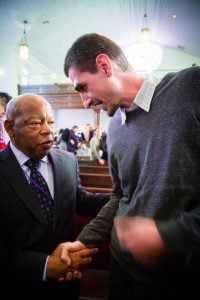In 2003, my wife Leah and I came to Durham to start the Rutba House, a Christian community of hospitality where the formerly homeless and the formerly housed share life together. Over cups of coffee and around our dinner table, we have learned the difficult stories behind the label “homeless” while also knowing the people who bear that label as friends. We have not ended homelessness in Durham, but we have seen that community is possible despite our fears and deep histories of division. We need not be afraid of those who beg for our help. In fact, our experience has convinced me that we cannot become the Durham we hope to be without them.
Our city’s new anti-panhandling ordinance has highlighted for us the importance of what we’ve learned at Rutba House over the past decade. Passed without public conversation as part of a consensus agenda in December, the new law did not go into effect until mid-January of this year. When it did, those who had purchased permits to beg under the old law were informed that they would be ticketed if they continued to “fly signs” at their usual stations. Within weeks, people who were asking for side jobs or spare change faced $250 fines. To date, at least two of them have gone to jail.
I do not believe City Council passed this new ordinance to send poor people to jail. Durham has an exceptional record in our state for the public services it offers, working closely with the faith community and other citizens of good will. A broad public/private alliance has endorsed our Inter-Neighborhood Council’s “Spare A Change” Campaign, encouraging citizens to support programs that help people move toward housing opportunities. We have a Coalition to End Homelessness, made up of people who work hard every day both to empower individuals and to change conditions so that it’s easier for people to find their way out of homelessness.
I celebrate these programs and am grateful for the many ways our elected officials have worked to support them.
Still, our programs have neither ended homelessness nor healed all of the wounds that leave some neighbors begging on our streets. No two stories are the same. The veteran who is suffering from PTSD is in Durham because his health care at the VA Hospital is free. He cannot imagine going into a shelter where he would have to negotiate relationships with dozens of other guys he does not know. So he camps in the woods. The woman who is on disability has an apartment, but after she pays the rent and utility bills, there’s not enough to buy food all month without asking for help.
Amidst the programs that we rightly celebrate are the lives of people whom we cannot ignore. They are our neighbors, our children, our veterans, our friends. In truth, the homeless are us. Only, their human vulnerability has been publicly exposed. When they stand on our roadways to ask for help, they are inviting all of us to consider what kind of community we want to be.
In response to their invitation, we at Rutba House have partnered with Durham Congregations in Action and End Poverty Durham to host Durham’s first public meeting on our new anti-panhandling ordinance. We will meet at 7pm tonight, March 21, at Duke Memorial United Methodist Church. All are invited to come and hear both from service providers and from neighbors who’ve been cited for violating this ordinance. Because this is an issue that touches the heart of our identity as a community, we believe it deserves our time and attention.











